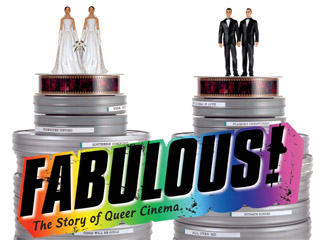Directed by Lisa Ades and Lesli Klainberg, Fabulous traces the history and development of queer cinema. The film starts at its origins in early European art house films, 50s muscle films and 60s female sexploitation/women’s prison films and how this slowly led to a cultivation of an American Queer cinema. The film is comprised of a number of interviews with queer filmmakers, producers, critics and actors who share their filmic inspiration, and feelings on how sexuality is portrayed on screen. John Waters’ interview is one of the best (though I’m somewhat biased), as he candidly discusses his own films such as Pink Flamingos and Female Trouble, also displaying an extensive knowledge of history and characterisation of Queer cinema. Waters and his collaborations with the late Divine, provided some of the forerunner material in the American Queer cinema, and his flippant lament of “the world of heterosexual is a sick and boring life” in Female Trouble was a cause for celebration within the GLBT audience.
John Cameron Mitchell, the director-writer-star of Hedwig and the Angry Inch, a queer-glitter-rock musical, also provides some great perception into transgender representation in cinema. Producer Christine Vachon, actresses Heather Matarazzo and Jane Lynch are also amusing and insightful. The documentary includes footage from a number of films which helped pioneer the movement of Queer cinema, including Blow Job (Warhol, 1963), Mala Noche (Van Sant, 1985), Paris is Burning (Livingstone, 1990), Bound (Wachowski, 1996) and Brokeback Mountain (Lee, 2005). Ades and Klainberg have an unobtrusive style of interviewing and their documentary brings to light a detailed history of GLBT cinema, a (somewhat reluctant) acceptance by Hollywood, and addresses some of the issues Queer cinema will have to face in the future.
Who will like it: Pretty much anyone interested in gender and sexuality issues (Fabulous has some great discussion about on-screen representations of both). Fans of GLBT cinema will appreciate the documentary as a more updated version of The Celluloid Closet (1995).
What I think: I found Fabulous appealing, especially as I had a pretty limited knowledge of queer/GLBT cinema. I did feel however, that certain filmmakers were not utilised enough in their interviews, such as Gus Van Sant (who spoke briefly about Mala Noche but not about his more recent films, which have gained wider reception in Hollywood). After watching This Film is Not Yet Rated, I found it interesting that both documentaries shared a number of films in common. This led me to question why queer films seem to pose a greater threat to the censors. Why anything other than straight, ‘normal’ sexual experiences is deemed unsuitable for a general audience? Overall, Fabulous was insightful, and somewhat thought-provoking, but personally, I felt it lacked the enthusiasm of some other film-themed documentaries.
By Steph.



No comments:
Post a Comment